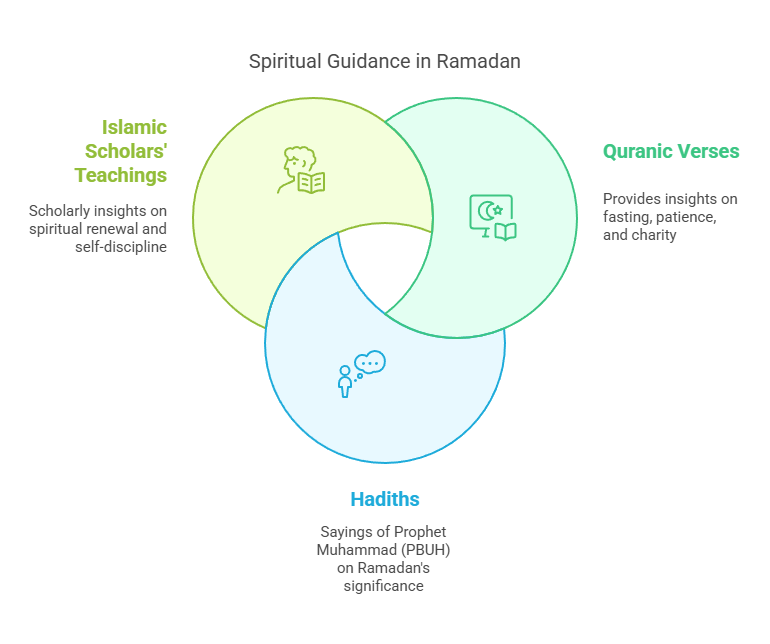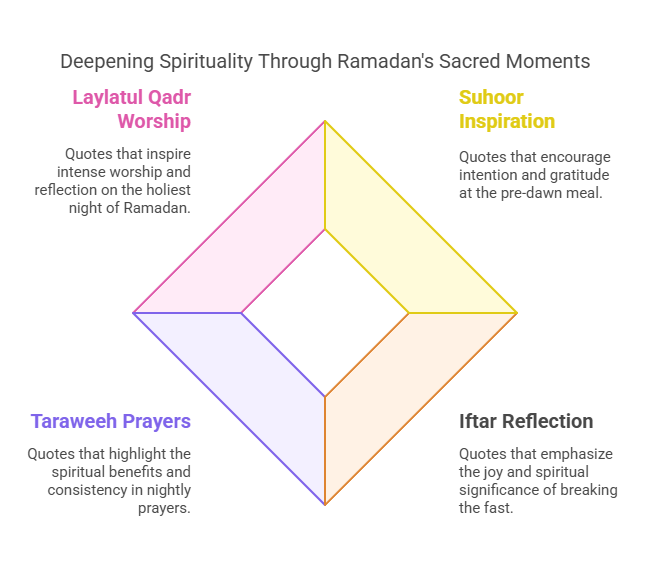
During Ramadan Muslims worldwide focus on spiritual development while striving to achieve a closer connection with Allah.
The use of Ramadan quotes stands as a powerful method to enrich the spiritual journey during the holy month.
Daily reminders of patience, gratitude, and compassion come from quotes selected from the Quran and Hadith and the teachings of Islamic scholars.
This article examines how Ramadan quotes affect mental health while demonstrating their motivational power during the holy month.
This guide provides you with quotes whether you need to share on social media platforms, reflect upon during Taraweeh prayers or teach them to your children.
Explore Ramadan quotes to understand their power to deepen your spiritual journey.
Categories of Ramadan Quotes
The holy month of Ramadan bears deep spiritual meaning while Ramadan quotes provide direction to Muslims around the world.
hese quotes can be categorized into three main sources: The Quran along with Hadith texts and teachings from Islamic scholars represent the three fundamental sources of Ramadan quotes.
The different categories provide distinct insights and inspiration which guide people through their spiritual journey in the sacred month.
Quotes from the Quran
Muslims view the Quran as their primary source of guidance and frequently recite its verses during Ramadan to provide inspiration and motivation.
Ramadan’s core themes of fasting, patience, charity and compassion are highlighted through these religious quotations.
Verses on Fasting and Patience
Fasting during Ramadan is one of the Five Pillars of Islam, and the Quran provides profound insights into its significance. One of the most frequently quoted verses is:
“O you who have believed, decreed upon you is fasting as it was decreed upon those before you that you may become righteous.” (Quran 2:183)
This verse highlights the universal nature of fasting and its purpose: to cultivate righteousness and self-discipline. Another powerful verse reminds believers of the rewards of patience:
“Indeed, the patient will be given their reward without account.” (Quran 39:10)
These verses serve as a reminder that fasting is not just about abstaining from food and drink but also about developing patience and resilience.
Verses on Charity and Compassion
Charity, or Zakat, is another key theme of Ramadan, and the Quran emphasizes its importance. One of the most cited verses on charity is:
“The example of those who spend their wealth in the way of Allah is like a seed [of grain] which grows seven spikes; in each spike is a hundred grains. And Allah multiplies [His reward] for whom He wills.” (Quran 2:261)
This verse illustrates the blessings that come with giving and encourages Muslims to be generous during Ramadan. Another verse highlights the importance of compassion:
“And they give food in spite of love for it to the needy, the orphan, and the captive.” (Quran 76:8)
These Quranic quotes remind us that Ramadan is not just a time for personal reflection but also for extending kindness and support to those in need.
Quotes from Hadith
Sayings of Prophet Muhammad (PBUH) on Ramadan
The Prophet Muhammad (PBUH) emphasized the importance of Ramadan in numerous Hadiths. One of the most famous is:
“When Ramadan begins, the gates of Paradise are opened, and the gates of Hell are closed, and the devils are chained.” (Sahih Bukhari)
This Hadith highlights the unique spiritual opportunities that Ramadan presents. Another saying of the Prophet (PBUH) encourages believers to seize the moment:
“Whoever fasts during Ramadan out of faith and seeking reward, his previous sins will be forgiven.” (Sahih Bukhari)
These quotes serve as a reminder of the immense blessings and forgiveness that come with observing Ramadan sincerely.
Hadiths on the Virtues of Fasting
Fasting is not just a physical act but a spiritual one, and the Hadiths provide deep insights into its virtues. The Prophet Muhammad (PBUH) said:
“Fasting is a shield; so when one of you is fasting, he should neither indulge in obscene language nor should he raise his voice in anger.” (Sahih Muslim)
This Hadith emphasizes the importance of self-control and good behavior during fasting. Another Hadith highlights the spiritual rewards of fasting:
“Every deed of the son of Adam is for himself except fasting; it is for Me, and I shall reward it.” (Sahih Bukhari)
These quotes remind us that fasting is a deeply personal act of worship, with rewards that are known only to Allah.
Quotes from Islamic Scholars
Islamic scholars throughout history have offered profound insights into the significance of Ramadan.
Their quotes provide a deeper understanding of the spiritual and practical aspects of fasting and worship.
Insights on Spiritual Renewal
Renowned Islamic scholar Imam Al-Ghazali once said:
“The essence of fasting is to weaken the forces that are the means of the devil, and to strengthen the soul by breaking the desires.”
This quote highlights the transformative power of fasting, which helps individuals overcome their base desires and focus on spiritual growth. Another scholar, Ibn Qayyim, emphasized the importance of intention:
“The value of an action lies in the intention behind it; if the intention is pure, the action will bear fruit.”
These insights remind us that Ramadan is a time for sincere reflection and renewal of intentions.
Wisdom on Self-Discipline
Self-discipline is a key theme of Ramadan, and Islamic scholars have often spoken about its importance. Scholar Hasan al-Basri said:
“The best form of worship is to control your desires and to discipline your soul.”
This quote underscores the idea that fasting is not just about abstaining from food but also about mastering one’s desires and impulses. Another scholar, Ibn Rajab, noted:
“Fasting is a means of attaining taqwa (God-consciousness), for it trains the soul to resist temptations and to remain steadfast in obedience to Allah.”
These quotes serve as a reminder that Ramadan is a time for cultivating self-discipline and strengthening one’s connection with Allah.
When Muslims reflect on these quotes they will gain a deeper understanding of Ramadan and strengthen their spiritual journey.
The Ramadan quotes draw inspiration from Quranic verses and prophetic teachings alongside scholarly wisdom.
Ramadan Quotes for Daily Inspiration
During Ramadan people find spiritual renewal and can use Ramadan quotes daily to remember the blessings and lessons taught throughout this sacred month.
These quotes serve as inspirational tools to help you make the most of every moment during Suhoor, Iftar, Taraweeh prayers and Laylatul Qadr in this blessed time.
We will examine powerful quotes that align with the essential moments of Ramadan.
Quotes for Suhoor and Iftar
Suhoor and Iftar serve as the daily meals which surround the fasting hours throughout Ramadan.
The periods surrounding Suhoor and Iftar extend beyond physical nourishment to include moments of reflection and gratitude while connecting with Allah.
These Ramadan quotes can provide inspiration to you throughout this holy month.
- For Suhoor:
“Eat Suhoor, for in Suhoor there is blessing.” (Sahih Bukhari)
This Hadith reminds us of the importance of starting the day with intention and gratitude. Suhoor is not just a meal; it’s a spiritual preparation for the day ahead.“The difference between our fasting and the fasting of the People of the Book is the meal of Suhoor.” (Sahih Muslim)
This quote highlights the uniqueness of Suhoor in Islamic tradition and encourages Muslims to embrace this blessed practice. - For Iftar:
“When the fasting person breaks his fast, his supplication is not rejected.” (Ibn Majah)
This Hadith emphasizes the power of dua during Iftar, a time when prayers are especially accepted.“The fasting person has two joys: one when he breaks his fast, and one when he meets his Lord.” (Sahih Bukhari)
This quote beautifully captures the dual joy of Iftar—the physical satisfaction of breaking the fast and the spiritual anticipation of divine reward.
These quotes can be shared with family and friends during Suhoor and Iftar, fostering a sense of unity and gratitude.
Quotes for Taraweeh Prayers
Taraweeh prayers are a special feature of Ramadan, offering an opportunity to connect deeply with the Quran and seek Allah’s mercy. Here are some Ramadan quotes to inspire you during these nightly prayers:
- On the Importance of Taraweeh:
“Whoever stands in prayer during Ramadan out of faith and seeking reward, his previous sins will be forgiven.” (Sahih Bukhari)
This Hadith highlights the immense spiritual benefits of Taraweeh prayers, encouraging believers to participate with sincerity.“The Quran is a healing for what is in the hearts, a guidance and mercy for the believers.” (Quran 17:82)
This verse reminds us that Taraweeh is not just about physical worship but also about healing and guidance through the Quran. - On Perseverance in Prayer:
“The most beloved deed to Allah is the most consistent, even if it is small.” (Sahih Bukhari)
This quote encourages consistency in Taraweeh prayers, even if it means praying a few rak’ahs each night.“Prayer is the ascension of the believer.” (Al-Hakim)
This saying of the Prophet (PBUH) elevates the status of prayer, reminding us of its transformative power.
These quotes can be shared in mosques or study circles to motivate others to join Taraweeh prayers and reflect on the Quran.
Quotes for Laylatul Qadr
Laylatul Qadr, the Night of Decree, is the most sacred night of Ramadan. It is a time of intense worship, reflection, and seeking Allah’s forgiveness. Here are some Ramadan quotes to inspire you during this blessed night:
- On the Significance of Laylatul Qadr:
“Indeed, We sent the Quran down during the Night of Decree. And what can make you know what the Night of Decree is? The Night of Decree is better than a thousand months.” (Quran 97:1-3)
This verse underscores the unparalleled value of Laylatul Qadr, urging believers to seek its blessings.“Whoever stands in prayer on Laylatul Qadr out of faith and seeking reward, his previous sins will be forgiven.” (Sahih Bukhari)
This Hadith highlights the immense spiritual rewards of worshiping on this night. - On Seeking Forgiveness:
“Allah descends to the lowest heaven during the last third of the night, saying, ‘Who is calling upon Me that I may answer him? Who is asking of Me that I may give him? Who is seeking My forgiveness that I may forgive him?’” (Sahih Bukhari)
This quote reminds us of the importance of seeking forgiveness during the late hours of Laylatul Qadr.“The supplication of a fasting person at the time of breaking fast is not rejected.” (Ibn Majah)
This Hadith encourages believers to make heartfelt duas during Iftar on Laylatul Qadr. - On Gratitude and Reflection:
“O Allah, You are Forgiving and love forgiveness, so forgive me.” (Tirmidhi)
This simple yet powerful dua is perfect for Laylatul Qadr, a night when forgiveness is abundantly granted.“The best supplication is that of Laylatul Qadr.” (Tirmidhi)
This quote emphasizes the importance of making sincere duas on this blessed night.
These quotes can be shared in mosques, social media, or family gatherings to inspire others to maximize their worship on Laylatul Qadr.
By incorporating these quotes into your daily routine, you can deepen your connection with Allah and make the most of Ramadan’s spiritual opportunities.
Whether it’s during Suhoor, Iftar, Taraweeh, or Laylatul Qadr, let these words guide and uplift you.
FAQs About Ramadan Quotes
- What are the best sources for Ramadan quotes?
- The best sources for Ramadan quotes are the Quran, Hadith, and the writings of Islamic scholars.
- How can I use Ramadan quotes in my daily life?
- You can use Ramadan quotes as daily affirmations, share them with family and friends, or post them on social media to inspire others.
- Are there specific quotes for Laylatul Qadr?
- Yes, there are many quotes and verses from the Quran that specifically mention the significance of Laylatul Qadr, such as Surah Al-Qadr (97:1-5).
- Can Ramadan quotes help with mental health?
- Absolutely. Ramadan quotes can promote positivity, reduce stress, and encourage gratitude, all of which are beneficial for mental health.
- How can I create my own Ramadan quotes?
- You can create your own Ramadan quotes by reflecting on your personal experiences, drawing inspiration from the Quran and Hadith, and focusing on themes like patience, gratitude, and compassion.





